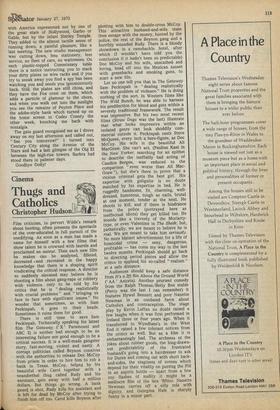Cinema
Thugs and Catholics
Christopher Hudson
Film criticism, to pervert Wilde's remark about hunting, often presents the spectacle of the over-educated in full pursuit of the unedifying. As soon as a man has made a name for himself with a few films that show talent he is crowned with laurels and proclaimed an auteur. Then each new film he makes can be analysed, filleted, decreated -and recreated in the happy knowledge that there is a shaping spirit vindicating the critical response. A director so suddenly elevated may believe he is shooting a film about gang-rape or robbery with violence, only to be told by his critics that he is "dealing realistically with crucial problems " and " bringing us face to face with significant issues." No wonder that sometimes, as with Sam Peckinpah, it goes to their heads. Sometimes it ruins them for good.
There is still time to save Sam Peckinpah. Technically speaking his latest film The Getaway (' X ' Paramount and ABC 2) is neither bad enough to be an interesting failure nor good enough to be a critical success. It is a well-made gangster story, fast-moving, violent and nasty. A corrupt politician called Beynon connives with the authorities to release Doc McCoy from prison in order to hire him to rob a bank in Texas. McCoy, helped by his beautiful wife Carol together with a neanderthal thug called Rudy and his assistant, gets away with half a million dollars. But things go wrong. A bank guard is shot, Rudy kills his assistant and is left for dead by McCoy after trying to finish him off too. Carol kills Beynon after
plotting with him to double-cross McCoy. This attractive husband-and-wife team then escape with the money, hunted by the police, the rest of the Beynon gang and a horribly wounded Rudy. There is a bloody showdown in a ramshackle hotel, after which (I wouldn't have told you the conclusion if it hadn't been so predictable) Doc McCoy and his wife, unscathed and loving, head off into the Mexican sunset with greenbacks and smoking guns, to start a new life.
Let no one tell you that in The Getaway Sam Peckinpah is " dealing realistically with the problem of violence." He is doing nothing of the sort. In Western films like The Wild Bunch, he was able to harness his predilection for blood and guts within a severely traditional framework. The result was impressive. But his two most recent films (Straw Dogs was the last) illustrate that what looks impressive within an isolated genre can look shoddily commercial outside it. Peckinpah casts Steve McQueen, every inch a hero-figure, as Doc McCoy. His wife is the beautiful Ali MacGraw. She can't act, (Pauline Kael in the New Yorker, searching for an epithet to describe the ineffably bad acting of Candice Bergen, was reduced to the comparison "even worse than Ali MacGraw "), but she's there to prove that a vicious criminal gets the best girl. His expertise with gelignite is no doubt matched by his expertise in bed. He is ruggedly handsome, fit, charming, welldressed, humorous, tough as nails, brutal at one moment, tender at the next. He shoots to kill, and if there is hindrance from the police (portrayed here as ineffectual idiots) they get killed too. He sounds like a travesty of the Moriartytype, or even Valentino in The Sheik: but, pathetically, we are meant to believe he is real. We are meant to take him seriously. No more blatant advertisement for a life of homicidal crime — sexy, dangerous, profitable — has come my way in the last twelve months. Peckinpah should go back to directing period pieces and allow the critics to applaud his so-called " realism " at a safe distance.
Audiences should keep a safe distance from It's a 2ft 6in Above the Ground World
(' AA ' Astoria). Another prurient comedy
from the Ralph Thomas/Betty Box stable (Percy was the last I can remember) it features Hywel Bennett and poor Nanette
Newman in an outdated farce about Catholics and contraception. The stage play by Kevin Laf fan no doubt raised a few laughs when it was first performed in Ireland three or four years ago. When it transferred to Wyndham' s in the West End it raised a few tolerant notices from the critics as well. But as a film it is embarrassingly bad. The archness of the jokes about rubber goods, the long-drawnout predictability of the frustrated husband's going into a hairdresser to ask for Durex and coming out with short backand-sides, the staginess of scenes which depend for their vitality on putting the Pill in an aspirin bottle — apart from a few coy flashes of nudity it might be a mediocre film of the late 'fifties. Nanette Newman carries off a silly role with dignity, and Georgina Hale is sharply funny in a minor part.


































 Previous page
Previous page